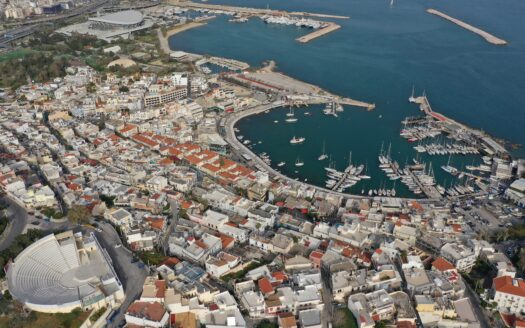A few words about Athens
Since 1834, Athens has served as Greece’s capital and the country’s largest and most populated metropolis. It is one of the world’s oldest cities, with a known history dating back to 3,200 BC.
It was named after the Greek goddess Athena. According to Attic legend, Athena and Poseidon fought because each desired to claim Athens as their own. As a result, the two adversaries, accompanied by the rest of the gods, climbed the Acropolis rock to combat. Kekropas, the then-king of Athens, was present with them and was watching the game. After the battle, the gods would decide who was the most fit to protect the city.
Poseidon, full with confidence, chose to make the start himself because he was certain of his win. So he hit the ground with his trident, and water came out immediately. He turned to Athena, pleased with the outcome, and waited to see what she would do. When Athena pounded hard with her foot along the marks made by Poseidon’s trident, an olive tree loaded of fruits blossomed. It was the first olive in history!
The argument was resolved, and Zeus directed the gods to evaluate the two presents and choose the best. Of course, King Cecrops had an essential part, as he noted that there was plenty of water from the sea that surrounding the city. As a result, he realized that Poseidon’s gift was useless. Instead, Athena’s olive tree was the first to grow in the country and provided food for the people. As a result, Athena was victorious, and the city was named for her.
Pericles reigned over Athens during its most brilliant period, the 5th century BC. The Parthenon was constructed during the Golden Age. It was the most important center of arts, knowledge, and philosophy until the 6th century, housing Plato’s Academy and Aristotle’s Lyceum. It is usually considered the cradle of democracy. Athens, and Greece in general during the time, is commonly referred to as the “cradle of Western civilization.”
Political satire, in fact, through the theater, had a significant impact on public opinion at the time and played an essential role in the city’s political events. During this time, Athens was home to some of the most important figures in Greek and European cultural and intellectual history, including the playwrights Aeschylus, Aristophanes, Euripides, and Sophocles, the philosophers Aristotle, Plato, and Socrates, the historians Herodotus, Thucydides, and Xenophon, the poet Simonides, the sculptor Phidias, and others. Pericles, the head of the Athenian Alliance, was the major figure of this period, using the money contributed by members of the “Delos Alliance” to build large monuments of the time, including the Parthenon.
Even throughout the reign of the Romans, Athens remained a cultural and spiritual center. In reality, during the Roman rule, Athens was given the status of “free city” because the Romans admired its culture, schools, and colleges. Athens became the Roman Emperor Hadrian’s favorite city throughout his reign. Hadrian erected and embellished Athens, including the beautiful Hadrian’s Library. In 44 AD, the Apostle Paul spoke to the Athenians from the rock of Areio Pagos during his travels in Greece.
Because Athens was not a significant city at the reign of King Otho, it was chosen as the capital of Greece for historical and romantic reasons. There were only a few significant buildings from the Byzantine Empire and the 18th century. With the establishment of the capital, the planning of a modern metropolis began, with the construction of new public buildings. The University of Athens (1837), the Old Royal Palace (now the Greek Parliament Building) (1843), the National Garden (1840), the Library (1842), the Academy (1885), the Zappeian Palace (1878), the Old Parliament Building (1858), the New Royal Palace (now the Presidential Palace) (1897), and the Athens City Hall are the most notable legacies of this period (1874).
Today, you can visit the city’s oldest and most beautiful buildings, which span centuries of history. The center is filled with gorgeous structures and museums that can narrate the stories of centuries, constituting the history of this city, which is undoubtedly Europe’s oldest. From the Parthenon’s unique architecture by Iktinus and Kallikrates to Chiler’s mature Greek classicism, the Parliament of the Hellenes, the Ilio Melathron, the National Theatre, and the National Archaeological Museum, Athens has magnificent buildings that the hurried rhythms with which we move often do not allow us to notice.
Modern Athens is Greece’s economic, industrial, political, and cultural epicenter. Athens comes alive at night. It supports a range preferences and desires by providing entertaining that is fascinating, original, and diverse. Countless clubs, crazy parties, alternative scenes, unending live concerts, various restaurants and hangouts provide entertainment at all hours of the day and night. From the live folk music in Plaka and Psirri’s rebetadikas and taverns to the wine bars around the Acropolis, the atmospheric hip hangouts for a leisurely drink in Monastiraki and Kolonaki, the classic cafés of Metaxourgeio, the bustling pubs of Exarcheion, to the Sacred Way bouzoukis. Without a doubt, Athens in the evenings more than makes up for the day’s events. It’s really a city that never sleeps.
By: Sissi Alevromageira, 25/7/2022




